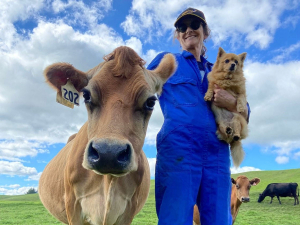Record final milk price for Miraka suppliers
Farmers supplying milk to Taupo-based processor Miraka are getting a 2024-25 season base milk price of $10.16/kgMS.
 Mokai dairy farmer Annabel Donovan is dedicated to giving back to her local community by donating 2,400 servings of dairy, from the paddock to the table of those who need it most.
Mokai dairy farmer Annabel Donovan is dedicated to giving back to her local community by donating 2,400 servings of dairy, from the paddock to the table of those who need it most.
For Mokai dairy farmers Annabel and Dean Donovan, helping to nourish their local community by donating milk just makes sense.
The Miraka suppliers donated 2,400 serves of dairy, consisting 600 litres, through Meat the Need & Feed Out for whanau and communities who need it most.
“You're not going to miss that amount of milk as a dairy farmer and what isn't a biggie for you, is for the foodbank,” says Annabel.
Milking 580 jersey cows once a day on their farm northwest of Taupo, the Donovan’s have been part of the community for more than 30 years.
“It makes sense that local milk feeds local people first and milk is an easy calcium, healthy fat and protein for people, so you know you’re doing a good thing,” she says.
“It would be tough enough to be in a situation where you need a food bank, let alone to turn up and not have the essentials.”
Feed Out facilitates donations of milk from Miraka and Fonterra farmers to turn into milk meals to supply to 115 food banks and community organisations across the country.
It’s almost too easy to donate Annabel said, all you need to do is tick a box.
“It’s just the easiest thing in the world which suits busy dairy farming families who want to support their community, and you’re not going to miss it because it’s a small amount in the scheme of an annual milk production,” she said.
Her message to other dairy farmers across the country is to put small amounts of milk back into the system regularly, to give to those who need it most.
Just one litre of milk can provide four serves of dairy for someone in need, said Meat the Need and Feed Out general manager Zellara Holden.
“Around 2.4% of New Zealand's total milk production is required to feed our whole country per year. If dairy farmers could donate one litre per cow, every year, we could all help change the face of food insecurity in Aotearoa by giving important nutrients to those bearing the brunt of food insecurity,” says Holden.
“It’s the collective that makes a difference and together, we have the power to nourish New Zealanders who need it most.”
To donate through Feed Out, farmers just need to fill out the form online at FeedOut.org or talk to their processor's representatives. The charity and the processors then take care of the rest.
There are options to choose which month to donate, and do a one-off or a recurring milk donation, with 100% of what is donated going to milk meals for those who need it most.
Recent weather events in the Bay of Plenty, Gisborne/Tairawhiti, and Canterbury have been declared a medium-scale adverse event.
DairyNZ's chief executive Campbell Parker says the 2024/25 dairy season reinforces the importance of the dairy sector to New Zealand.
A New Zealand agribusiness helping to turn a long-standing animal welfare and waste issue into a high-value protein stream has won the Australian dairy sector's top innovator award.
OPINION: A bumper season all around.
Dairy Women's Network (DWN) has announced that Taranaki dairy farmer Nicola Bryant will join its Trust Board as an Associate Trustee.
Rural Women New Zealand (RWNZ) says it welcomes the release of a new report into pay equity.

OPINION: A mate of yours truly reckons rural Manawatu families are the latest to suffer under what he calls the…
OPINION: If old Winston Peters thinks building trade relations with new nations, such as India, isn't a necessary investment in…